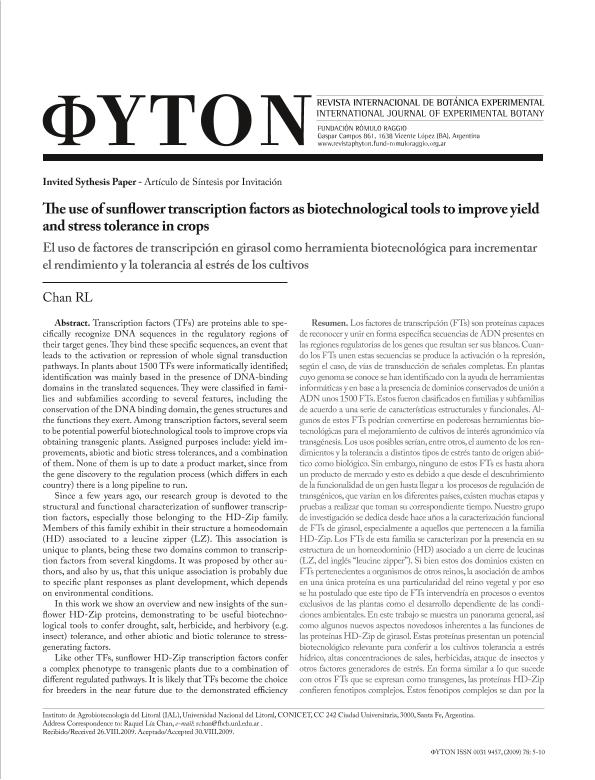Mostrar el registro sencillo del ítem
dc.contributor.author
Chan, Raquel Lia

dc.date.available
2020-05-01T20:47:48Z
dc.date.issued
2009-12
dc.identifier.citation
Chan, Raquel Lia; Plant transcription factors asbiotechnological tools; Fundación Rómulo Raggio; Phyton; 78; 12-2009; 5-10
dc.identifier.issn
0031-9457
dc.identifier.uri
http://hdl.handle.net/11336/104082
dc.description.abstract
Transcription factors (TFs) are proteins able to specifically recognize DNA sequences in the regulatory regions of their target genes. They bind these specific sequences, an event that leads to the activation or repression of whole signal transduction pathways. In plants about 1500 TFs were informatically identified; identification mainly based in the presence of DNA-binding domains in the translated sequences. They were classified in families and subfamilies according to several features including the conservation of the DNA binding domain, the genes structure and the functions they exert. Among transcription factors, several seem to be potential powerful biotechnological tools in order to improve crops via the obtaining of transgenic plants. The assigned uses present a variety of purposes including the improvement in yield, abiotic and biotic stresses tolerances as well as a combination of them. None of them is up to now a product market since from the gene discovery to the regulation process that differs in each country there is a long pipeline to run.Our research group is devoted since a few years ago to the structural and functional characterization of sunflower transcription factors, especially those belonging to the HD-Zip family. Members of this family exhibit in their structure a homeodomain (HD) associated to a leucine zipper (LZ). This association is unique to plants being these two domains common to transcription factors from several kingdoms. It was proposed by other authors and also by us that this unique association is probably due to specific plant functions like the environmental conditions dependent development. In this work we show an overview as well as new insights of the sunflower HD-Zip proteins demonstrating to be useful biotechnological tools in order to confer drought tolerance, salt tolerance, tolerance to herbicides, insects attack and other abiotic and biotic factors generating stressLike other TFs, sunflower HD-Zip transcription factors confer to transgenic plants a complex phenotype due to a combination of different regulated pathways. It is likely that TFs become in the near future the choice for breeders due to the demonstrated efficiency conferring desired traits to transgenic plants. Additionally, for the public perception the over or ectopic expression of a plant gene should be more accepted than the use of molecules from foreign organisms.
dc.format
application/pdf
dc.language.iso
eng
dc.publisher
Fundación Rómulo Raggio

dc.rights
info:eu-repo/semantics/openAccess
dc.rights.uri
https://creativecommons.org/licenses/by-nc-sa/2.5/ar/
dc.subject
transcription factor
dc.subject
sunflower
dc.subject
biotechnology
dc.subject
plant TFs
dc.subject.classification
Bioquímica y Biología Molecular

dc.subject.classification
Ciencias Biológicas

dc.subject.classification
CIENCIAS NATURALES Y EXACTAS

dc.title
Plant transcription factors asbiotechnological tools
dc.type
info:eu-repo/semantics/article
dc.type
info:ar-repo/semantics/artículo
dc.type
info:eu-repo/semantics/publishedVersion
dc.date.updated
2020-04-28T13:09:18Z
dc.journal.volume
78
dc.journal.pagination
5-10
dc.journal.pais
Argentina

dc.journal.ciudad
Bahía Blanca
dc.description.fil
Fil: Chan, Raquel Lia. Consejo Nacional de Investigaciones Científicas y Técnicas. Centro Científico Tecnológico Conicet - Santa Fe. Instituto de Agrobiotecnología del Litoral. Universidad Nacional del Litoral. Instituto de Agrobiotecnología del Litoral; Argentina
dc.journal.title
Phyton

Archivos asociados
